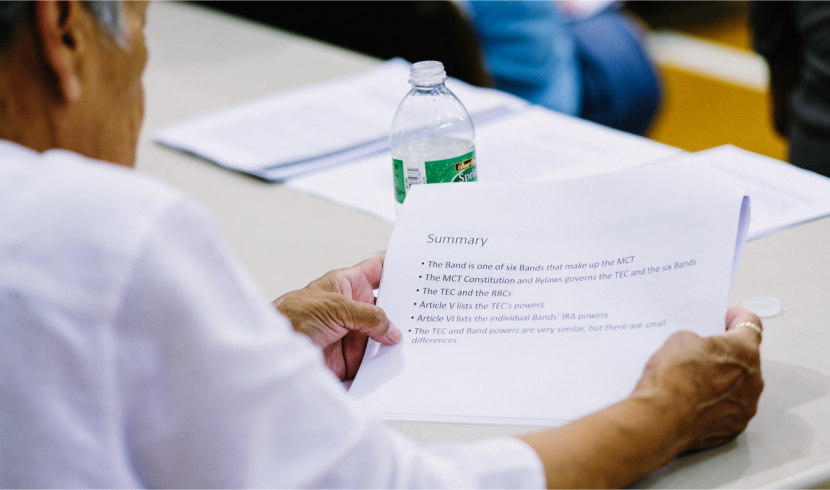
Hundreds of Band members attended informational meetings in July to learn about the Constitutional Convention scheduled by the Minnesota Chippewa Tribe’s Tribal Executive Committee.
At a special meeting on June 29 at Northern Lights Casino in Walker, the Tribal Executive Committee (TEC) of the Minnesota Chippewa Tribe (MCT) scheduled three constitutional convention meetings to be held around the state in August, September and October .
After that meeting, Band members requested more information on the issues in preparation for the conventions.
The informational meetings were led by Syngen Kanassatega, legal counsel for the Chief Executive’s office, with help from consultant Tadd Johnson, and were held at Aazhoomog Community Center July 17, District I Community Center July 18 and All Nations Church in the urban area July 20. A meeting scheduled for East Lake Community Center July 19 was postponed due to scheduling conflicts.
At the Aazhoomog meeting, Syngen explained the reason for the sessions: “We wanted to put together a presentation to answer questions about where the Minnesota Chippewa Tribe (MCT) came from, the relationship between the Mille Lacs Band and the MCT, the proposed constitutional convention, and to answer questions about what Band members need to know and what they can do.”
Syngen’s presentation began with the history of the MCT, which was formed as part of the Indian Reorganization Act in 1934, and the Constitution, which was approved in 1936 by a vote of tribal members. However, as Syngen explained, many people didn’t vote, and their votes were counted as ‘yes’ votes by the Bureau of Indian Affairs.
The MCT is governed by a Tribal Executive Committee composed of the Chair or Chief Executive and the Secretary-Treasurer of each of the six MCT Bands: Mille Lacs, White Earth, Leech Lake, Bois Forte, Fond Du Lac and Grand Portage.
Chief Executive Melanie Benjamin and Secretary-Treasurer Carolyn Beaulieu represent Mille Lacs.
As self-governance expanded over the last several decades, MCT member bands have dealt more directly with the federal government, reducing the MCT’s role in distributing federal funds and running programs.
Urban Area
About 20 people attended the July 20 meeting at All Nations Church in Minneapolis.
Syngen was not available that evening, so the presentation was given by Tadd Johnson, who is Director of the Master of Tribal Administration and Governance (MTAG) program at the University of Minnesota-Duluth. Tadd informed the group that Syngen had created the presentation.
“The Mille Lacs Band has written its own statutes — which are two books thick,” said Tadd. “In a lot of things Mille Lacs was way ahead of its time. Mille Lacs was the first tribe to negotiate self-governance. Self-governance changed everything for the Mille Lacs Band.”
One Band member in attendance wondered aloud, “Where does the Band go from here?”
Tadd replied, “The future of the Band is in your hands right now. It depends on if you get involved. The constitutional conventions will impact your future.”
Band members were also urged to participate in the meetings that are being held on Aug. 21 and 22. The first meetings are critical because they will help impact what could happen, so it’s important that Band members attend to have a strong voice in the process.
Another Band member wondered what leaders wanted and if the elected officials would take the time to share their position on the matters that are on the table.
Others added that a statement from elected officials would be beneficial for all Band members so they know the points of view of those representing them at the meetings.